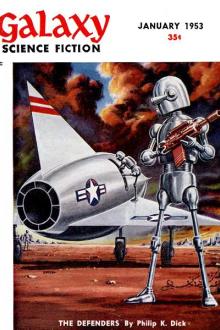Short Fiction by Philip K. Dick (popular books to read TXT) 📕

- Author: Philip K. Dick
Book online «Short Fiction by Philip K. Dick (popular books to read TXT) 📕». Author Philip K. Dick
“How’s it look?” Kramer asked.
“All right.” Winter got up. “He tells me that it would be best to take off manually. The robot controls—” Winter hesitated. “I mean, the built-in controls, can take over later on in space.”
“That’s right,” the pilot said. “It’s customary with the Johnson system, and so in this case we should—”
“Can you tell anything yet?” Kramer asked.
“No,” the pilot said slowly. “I don’t think so. I’ve been going over everything. It seems to be in good order. There’s only one thing I wanted to ask you about.” He put his hand on the control board. “There are some changes here I don’t understand.”
“Changes?”
“Alterations from the original design. I wonder what the purpose is.”
Kramer took a set of the plans from his coat. “Let me look.” He turned the pages over. The pilot watched carefully over his shoulder.
“The changes aren’t indicated on your copy,” the pilot said. “I wonder—” He stopped. Commander Gross had entered the control cabin.
“Gross, who authorized alterations?” Kramer said. “Some of the wiring has been changed.”
“Why, your old friend.” Gross signaled to the field tower through the window.
“My old friend?”
“The Professor. He took quite an active interest.” Gross turned to the pilot. “Let’s get going. We have to take this out past gravity for the test they tell me. Well, perhaps it’s for the best. Are you ready?”
“Sure.” The pilot sat down and moved some of the controls around. “Anytime.”
“Go ahead, then,” Gross said.
“The Professor—” Kramer began, but at that moment there was a tremendous roar and the ship leaped under him. He grasped one of the wall holds and hung on as best he could. The cabin was filling with a steady throbbing, the raging of the jet turbines underneath them.
The ship leaped. Kramer closed his eyes and held his breath. They were moving out into space, gaining speed each moment.
“Well, what do you think?” Winter said nervously. “Is it time yet?”
“A little longer,” Kramer said. He was sitting on the floor of the cabin, down by the control wiring. He had removed the metal covering-plate, exposing the complicated maze of relay wiring. He was studying it, comparing it to the wiring diagrams.
“What’s the matter?” Gross said.
“These changes. I can’t figure out what they’re for. The only pattern I can make out is that for some reason—”
“Let me look,” the pilot said. He squatted down beside Kramer. “You were saying?”
“See this lead here? Originally it was switch controlled. It closed and opened automatically, according to temperature change. Now it’s wired so that the central control system operates it. The same with the others. A lot of this was still mechanical, worked by pressure, temperature, stress. Now it’s under the central master.”
“The brain?” Gross said. “You mean it’s been altered so that the brain manipulates it?”
Kramer nodded. “Maybe Professor Thomas felt that no mechanical relays could be trusted. Maybe he thought that things would be happening too fast. But some of these could close in a split second. The brake rockets could go on as quickly as—”
“Hey,” Winter said from the control seat. “We’re getting near the moon stations. What’ll I do?”
They looked out the port. The corroded surface of the moon gleamed up at them, a corrupt and sickening sight. They were moving swiftly toward it.
“I’ll take it,” the pilot said. He eased Winter out of the way and strapped himself in place. The ship began to move away from the moon as he manipulated the controls. Down below them they could see the observation stations dotting the surface, and the tiny squares that were the openings of the underground factories and hangars. A red blinker winked up at them and the pilot’s fingers moved on the board in answer.
“We’re past the moon,” the pilot said, after a time. The moon had fallen behind them; the ship was heading into outer space. “Well, we can go ahead with it.”
Kramer did not answer.
“Mr. Kramer, we can go ahead any time.”
Kramer started. “Sorry. I was thinking. All right, thanks.” He frowned, deep in thought.
“What is it?” Gross asked.
“The wiring changes. Did you understand the reason for them when you gave the okay to the workmen?”
Gross flushed. “You know I know nothing about technical material. I’m in Security.”
“Then you should have consulted me.”
“What does it matter?” Gross grinned wryly. “We’re going to have to start putting our faith in the old man sooner or later.”
The pilot stepped back from the board. His face was pale and set. “Well, it’s done,” he said. “That’s it.”
“What’s done?” Kramer said.
“We’re on automatic. The brain. I turned the board over to it—to him, I mean. The Old Man.” The pilot lit a cigarette and puffed nervously. “Let’s keep our fingers crossed.”
The ship was coasting evenly, in the hands of its invisible pilot. Far down inside the ship, carefully armoured and protected, a soft human brain lay in a tank of liquid, a thousand minute electric charges playing over its surface. As the charges rose they were picked up and amplified, fed into relay systems, advanced, carried on through the entire ship—
Gross wiped his forehead nervously. “So he is running it, now. I hope he knows what he’s doing.”
Kramer nodded enigmatically. “I think he does.”
“What do you mean?”
“Nothing.” Kramer walked to the port. “I see we’re still moving in a straight line.” He picked up the microphone. “We can instruct the brain orally, through this.” He blew against the microphone experimentally.
“Go on,” Winter said.
“Bring the ship





Comments (0)